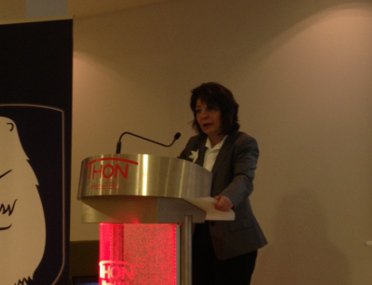The EU and Greenland: close partners in changing times

Commissioner Maria Damanaki delivered a speech at the Seminar on Greenland and Arctic organised by the Greenland Representation Office in Brussels.
.

Dear Minister, Ladies and Gentlemen,
It is a great pleasure to be here. When I received the invitation, my mind went straight to my visit to Greenland exactly a year ago. It was a very special trip for me. For the first time I had the opportunity to see with my own eyes the stunning beauty of the gigantic ice sculptures in Disko Bay. And also the fragile nature of the Arctic and the quick changes that are happening there.
Speaking with various people during that trip, I realized that today Greenland is going through a particularly important time in its history.
The Self-Government Act of 2009 increased Government’s powers, also in terms of managing the territory's vast and untapped natural resources. So, Greenland remains an important partner for the EU. But, let it be said, EU-Greenland ties are complex. I remember the 1985 referendum, when 53% opted out. However, still today, as one of the EU's Overseas Countries and Territories, the country remains closely associated with the EU and a key focus of the EU’s Arctic policy.
The new protocol to the Fisheries Partnership Agreement that came into force this year is one very important example of those close ties. And it is one of the EU’s most modern bilateral fisheries agreements. Based on mutual economic benefit, it promotes sustainable and responsible fishing, contains a human rights clause and an agreement on scientific cooperation to make sure that fish stocks are maintained at sustainable levels.
Dear Minister, Ladies and Gentlemen, I already hinted at Greenland’s vast and untapped natural resources. The exploitation of minerals and oil will have great potential. The Western and South-Western parts of Greenland are also becoming tourism hubs for cruise liners carrying American, Canadian and European tourists eager to marvel at Greenland’s breath-taking landscapes. With possible new Arctic shipping routes through the East, West and center of the Arctic, places such as Nuuk and Illulisat are well placed to become important trading hubs.
However, these avenues of economic growth are not danger free. The mind races to accidents like the one with the Costa Concordia in the Mediterranean or the Deepwater Horizon in the Gulf of Mexico. These major accidents happened in waters, where we're supposed to have prompt response mechanisms. So what would be the consequences in ice-cold waters, where rescue mechanisms are scarcer? These are challenges that carry responsibilities not just for the Arctic countries and territories, but also for all those who carry out those activities.
This is why the EU wants to remain engaged with all players – Arctic countries and EU economic actors alike - and remain active in Greenland.
The Commission is now negotiating an EU-Greenland Partnership with the Council that contains the right hooks for this. The proposal foresees improved policy dialogue on several possible areas of cooperation and a substantial financial envelope to back this up. We have to decide together in the next few months which specific sectors should receive this aid. In the current financial period it was education. And this was the right choice – as confirmed by the encouraging results already at hand.
The future agreement remains directed towards the sustainable development of Greenland, both social and economic. But the Commission goes beyond that and seeks to broaden the partnership to issues of common concern such as research, arctic issues and climate change.
Aside from the partnership, Greenland will also be a key partner in the EU’s Northern Periphery and Arctic funding programme for regional development. This is tailored to the specific challenges people meet in Northern remote areas.
At international level, the EU is working towards completing the negotiations on a robust and mandatory "polar code", to ensure the safety of vessels venturing into polar areas. We are also strongly committed to reach in 2015 a new, ambitious global deal on reducing greenhouse gas emissions.
I said earlier that our relations with Greenland are sometimes complex.
I know that the EU rules restricting the trade of seal pup skins in the early 1980s stirred strong emotions in Greenland. And of course the 2009 ban on trade of seal products into the EU was not well received.
I am aware of those views. Taking into careful consideration the views and concerns of indigenous groups, we built into the rules an exemption for seal products derived from traditional hunts for subsistence purposes.
One could consider this a novelty, because similar bans in other countries – like in Russia, the United States or Mexico – have no such exemption. I was therefore happy that since last April the indigenous people of Greenland have been able to benefit from this exemption.
Last but not least, I would like to touch upon the outcome of the Arctic Council Ministerial in Kiruna, Sweden, last May.
The Arctic is changing rapidly and the consequences are global. This should not be used as a pretext for geopolitical power play. On the contrary, it should all be about cooperating in partnership to manage these changes. We are committed to the Arctic Council. And further to the Kiruna decision, we are going to make a constructive contribution – in the interest of the Arctic.
Thank you.


